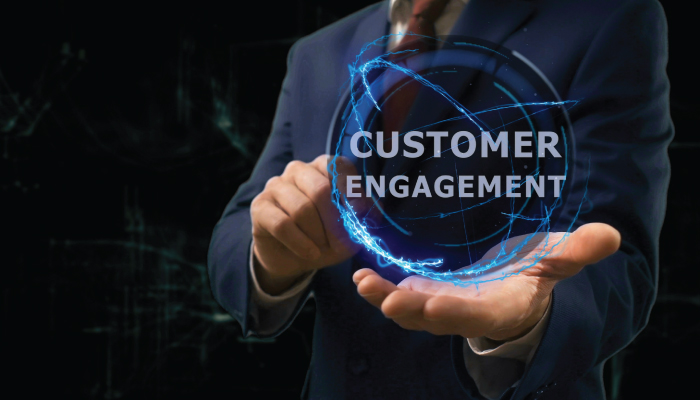In the world of B2B (business-to-business) transactions, customer engagement is a crucial aspect that directly influences the success and growth of enterprises. Unlike B2C (business-to-consumer) interactions, B2B engagements involve complex relationships and longer sales cycles. In this article, we’ll delve into the strategies and techniques that foster effective B2B customer engagement, ensuring businesses thrive in competitive landscapes.
Understanding B2B Customer Engagement

B2B customer engagement refers to the interactions, strategies, and efforts employed by businesses to build and maintain relationships with their business clients. Unlike B2C interactions, B2B engagements involve catering to the unique needs and complexities of fellow enterprises. This necessitates a deeper understanding of clients’ industries, pain points, and objectives.
Importance of B2B Customer Engagement
Effective B2B customer engagement holds the key to sustained business growth. Engaged clients are more likely to become loyal advocates, leading to increased referrals and repeat business. Moreover, engaged customers provide valuable feedback that drives product improvements and innovation.
Challenges in B2B Customer Engagement
B2B engagements come with their fair share of challenges. The intricate nature of B2B transactions often results in longer sales cycles, making it crucial to maintain consistent engagement throughout the process. Additionally, B2B clients demand personalized solutions that align with their specific needs.
Crafting a Customer-Centric Approach
1. The Power of Personalization
Personalization lies at the core of successful B2B engagements. Tailoring interactions and solutions to each client’s pain points and objectives fosters a sense of importance and value.
2. Tailoring Solutions to Pain Points
Understanding the challenges faced by clients enables businesses to provide solutions that directly address their pain points. This approach not only showcases empathy but also demonstrates expertise.
Leveraging Technology for Engagement
1. Implementing CRM Systems
Customer Relationship Management (CRM) systems allow businesses to track interactions, preferences, and purchase history. This data enables more informed engagement strategies.
2. Marketing Automation Tools
Automation streamlines communication by sending targeted messages at the right time. This ensures timely follow-ups and relevant information sharing.
Effective Communication Strategies
1. Building Trust Through Transparency
Open and transparent communication builds trust, which is essential for long-term B2B relationships. Clear expectations and honest discussions lead to smoother collaborations.
2. Active Listening and Feedback Loop
Engagement involves active listening to clients’ feedback and concerns. Establishing a feedback loop helps in refining services and demonstrating a commitment to improvement.
Creating Valuable Content for B2B Audiences
1. Thought Leadership Content
Sharing industry insights and expertise through thought leadership content positions businesses as valuable partners. This content can be in the form of blogs, whitepapers, and reports.
2. Educational Webinars and Workshops
Hosting webinars and workshops that offer practical knowledge and solutions showcases a commitment to clients’ success. It also provides a platform for interactive engagement.
Nurturing Long-Term Relationships
1. Consistent Follow-ups and Check-ins
Regular follow-ups and check-ins demonstrate ongoing dedication to client success. These interactions also provide opportunities to address any evolving needs.
2. Exclusive Loyalty Programs
Loyalty programs reward and incentivize long-term partnerships. Exclusive offers or benefits showcase appreciation for continued collaboration.
Measuring and Analyzing Engagement
1. Key Performance Indicators (KPIs)
Tracking KPIs such as customer satisfaction, retention rates, and engagement levels provides insights into the effectiveness of engagement strategies.
2. Data-Driven Decision Making
Analyzing engagement data helps in making informed decisions. It allows for the refinement of strategies based on what resonates with clients.
Adapting to Changing Dynamics
1. Embracing Omnichannel Engagement
Incorporating multiple communication channels, such as email, social media, and in-person meetings, ensures engagement on clients’ preferred platforms.
2. Agility in Shifting Market Trends
Adapting to changing market dynamics showcases a business’s resilience. Flexibility in engagement strategies helps in catering to evolving client needs.
Collaborative Approach: Partnering for Success
1. Synergizing Resources and Expertise
Collaborative engagement involves pooling resources and expertise for mutual growth. It fosters an environment of innovation and shared success.
2. Joint Innovation and Co-Creation
Engaging clients in joint innovation and co-creation of solutions strengthens partnerships. It also results in tailored products that precisely meet clients’ requirements.
Future Trends of B2B Customer Engagement
As technology continues to evolve, B2B customer engagement will become increasingly sophisticated. AI-driven personalization, augmented reality presentations, and seamless virtual interactions are just a few glimpses into the future.
Conclusion
In the realm of B2B transactions, customer engagement is not a mere formality; it’s a strategic imperative. Effective engagement fosters trust, loyalty, and innovation, propelling businesses toward long-term success. By adopting personalized approaches, leveraging technology, and nurturing collaborative partnerships, businesses can build lasting connections that stand the test of time.
Ready to enhance your B2B customer engagement strategies? Request a demo from AIM Technologies today to see how our cutting-edge solutions can transform your business relationships.
FAQs
What are some common challenges in B2B customer engagement?
- B2B engagements often face challenges like longer sales cycles and the need for personalized solutions.
How can businesses measure the effectiveness of their engagement strategies?
- Businesses can track KPIs such as customer satisfaction, retention rates, and engagement levels to assess strategy effectiveness.
What role does technology play in B2B customer engagement?
- Technology, including CRM systems and marketing automation tools, streamlines communication and provides insights for better engagement.
How does collaborative engagement benefit both businesses and clients?
- Collaborative engagement allows businesses and clients to pool resources, share expertise, and innovate together, leading to mutual growth.
What does the future of B2B customer engagement look like?
- The future holds AI-driven personalization, virtual interactions, and innovative technologies that elevate B2B customer engagement.




